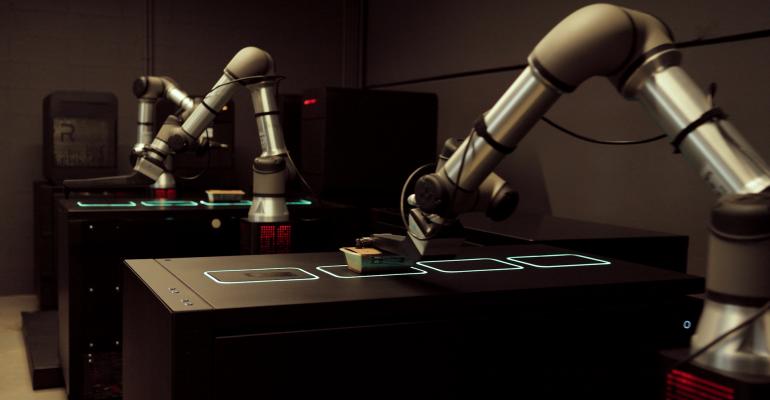At this point in time, robot-run restaurants are nothing new: from flipping burgers to frying tortilla chips and preparing French fries, robotic arm assembly lines have been making headlines and taking up space on conference show floors for years now. But Remy Robotics — a Spanish foodservice robotics company — claims to take a new approach to AI-powered restaurants by enlisting robots to accomplish what they’re good at and letting humans take care of the rest.
Remy Robotics just debuted Better Days: a health-focused, fast-fine restaurant in New York City that uses the company’s robotics platform to power the delivery-focused restaurant. The result is a human-free storefront where humans prep the menu off-site and then deliver it to the automated restaurants for robot arms to finish the job in a spin on the hub and spoke operations model. Better Days is just the start of the company’s plans to expand in the United States, with the long-term goal of opening more robot-run eateries throughout North America.
“If you need to produce different types of food and multiple different iterations, robotics is not quite there yet,” Yegor Traiman, founder and CEO of Remy Robotics, said. “The level of robotics is still far away from the dexterity of what humans have… It ends up being much easier [for most companies] to build high-tech vending machines… you won’t see our restaurants chopping, flipping, cutting because the quality of the technology is just not quite there yet.”
So if Remy’s robots won’t flip, cut or chop, then what will they do? Traiman said that even though humans have better dexterity than robots, robots are much better at precision. In this way, they are able to share the tasks between the human prep chefs and robot chefs on-site to produce a working co-bot model.
“We build a partnership where human chefs do prep, including packaging… they package these ingredients into specifically designed packaging and produce a dish which the robot can manipulate or iterate,” Traiman said. “Then this package will be delivered to our restaurants, where the robots work autonomously to finish the product.”
To put the science in layman’s terms, Remy Robotics takes a recipe and converts it into an exact algorithm using multiple parameters, including weight, viscosity, and composition of a dish, so that the robot can take the prepared package and put it into the oven, while taking into account the variables and required outcome for a correctly made finished product. An ingredient like broccoli, for example, will be cleaned and chopped at the commissary kitchen by chefs and then delivered to the robots to be fully cooked inside the packaging.
“It allows us to cook a dish up to any desired state every time consistently, because it’s not based on the tuition – it’s based on the exact formula,” Traiman said. “The robot can then open the oven, take the dish from the oven, and does multiple quality control checks. For example, it uses the thermal camera to create a thermal image of the dish inside the package without opening it and compares this thermal image with a network of thousands of other images to know if the dish is cooked properly.”
Remy Robotics currently uses CloudKitchens delivery services for off-premises distribution, and in the future, the company would want to build more restaurants that are takeout and delivery-focused, but also offer some limited physical dining space. Currently customers can order through any of the major third-party delivery apps or through the Remy Robotics app or website. The AI technology is able to time preparation of a dish precisely so that customers will be able to pick up their order at the exact moment it’s ready from a pickup food locker.
If Better Days is successful, Traiman said that the company will be able to franchise the concept and automated operations model for future locations around the country.
“I haven't seen any true robotization of the entire restaurant operation,” he said. “And this is what we did. We have end-to-end automation and autonomy of the entire restaurant operations, and we are the only ones doing this.”
Contact Joanna at [email protected]m





